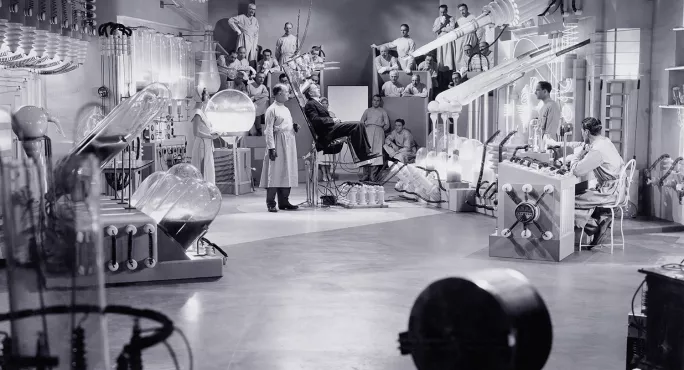- Home
- Relying on research is ‘dangerous’, teachers warned
Relying on research is ‘dangerous’, teachers warned

Too much reliance on “off-the-shelf” ideas drawn from research in the classroom is “dangerous” and can undermine teacher expertise, a leading education academic and former government schools tsar has warned.
According to Professor Mel Ainscow, the current focus on basing classroom pedagogy on research could become problematic.
“There are dangerous side products” of this approach, he told Tes. “It gives the idea that there are simple, off-the-shelf solutions for complex problems.”
“It also disregards the expertise of the teachers,” the academic, whom ministers appointed to lead the Greater Manchester Challenge school improvement programme, added. “You have to start from what’s there.”
News: North ‘should lead its own schools transformation’
Exclusive: Manchester schools tsar condemns Education Endowment Foundation as ‘dangerous’
Quick read: Professor aims to break link between disadvantage and low attainment for Manchester’s pupils
In a forthcoming book he has co-written on the subject he details how what may work in one educational context can fail in another.
Professor Ainscow draws on 20 years of research, as well as his experience with the Greater Manchester Challenge from 2008-11.
However, advocates of using research in education have defended the approach.
‘Homeopathic’ teaching
Tom Bennett, the Department for Education’s behaviour tsar and founder of ResearchEd, said teaching without using evidence-based research was akin to homeopathic medicine.
“Teachers have been struggling for centuries with intuitive methodologies, or ones based on 19th-century hunches, or folklore,” he said.
“I call this blend of craft, gut and hope ‘faith teaching’ because it resembles folk medicine in its relationship with the real world.
“It forces teachers to re-invent the wheel every single generation, as they are encouraged to work it out for themselves but this results in countless hours wasted making mistakes.
“Teachers still need judgement, wisdom and experience, but how much better for students and schools if we lean into the best evidence bases we have? What is the alternative homeopathic teaching, where ‘I reckon’ trumps all considerations? Let’s not go back to that.”
But Professor Ainscow’s argument is that a focus on research encourages teachers to use simplistic solutions designed by researchers that may be ineffectual in their particular school.
“What works would seem to depend on local capacity and leadership rather than on simplistic notions of school or local authority-led change,” his new book says.
“The implication is that policymakers and practitioners [teachers] are there to ‘deliver’ practices that have been designed and evaluated by researchers - this means that those in the field are characterised as users of expert knowledge, not as creators,” the book concludes.
It considers the effect of the London Challenge - a New Labour school improvement initiative for the capital during the early part of the 21st century.
It notes that one of the significant features of the challenge was how its architects, such as Sir Tim Brighouse, ensured it was “relevant to the particular circumstances within the capital city”.
And it uses two case studies from Knowsley and Plymouth as examples of how significant school context can be when putting research findings into practice.
In 2016, a strategy to improve schools in Knowsley was implemented using the Department for Education’s school improvement fund, focused on 26 primaries and four secondary schools.
These schools were designed to be “pathways to success” - their progress and improvement would drive up standards across the area, which faces considerable economic and social deprivation.
However, although there were signs of success, by 2018 there were considerable doubts about its future, partly because there was a strong collaborative culture between Knowsley’s schools “that, perversely, tends to act as a barrier to change”.
In Plymouth, a similar programme was implemented, yet was largely unsuccessful through a lack of political will behind it.
The researchers emphasise that a variety of factors are needed to effect long-term change in education, such as understanding of school contexts, leadership and a strong political mandate.
Professor Ainscow said he believed the problem of educational inequality is not wholly political.
“Successive governments have tried to crack it,” he told Tes. “There is a consensus there across political parties. But politicians want a quick fix, they are thinking ahead to the next election, and in reality these things take time.”
Powerful tool
Stephen Fraser, deputy chief executive of the Education Endowment Foundation - the DfE supported charity which researches what works in schools - said: “Rather than disenfranchising teachers, our experience has been that research evidence can empower teachers to act with greater confidence and professional authority.
“Quality evidence gives teachers access to a wealth of information about what has and hasn’t worked for similar groups of pupils in the past, allowing them to build on the experiences of their colleagues to make improvements to their own classroom practice.”
“When used alongside professional judgement and knowledge of their pupils and communities, evidence can be a powerful tool for teachers to resist fads and fashions.”
Changing Education Systems: A Research-based Approach by Mel Ainscow, Christopher Chapman and Mark Hadfield is published by Routledge
Keep reading for just £1 per month
You've reached your limit of free articles this month. Subscribe for £1 per month for three months and get:
- Unlimited access to all Tes magazine content
- Exclusive subscriber-only stories
- Award-winning email newsletters



